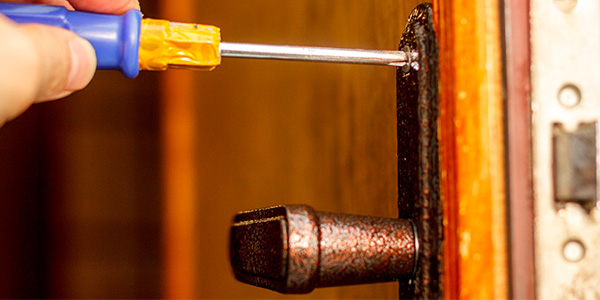How to Handle an Estate Cleanout

How to Clean Out a House
The month after a loved one’s death can be difficult and hectic. As if the loss itself isn’t enough, you suddenly have a long list of to-do’s piled onto your plate, often with tight deadlines attached. Handling an estate cleanout is a demanding task, but you don’t have to do it alone. We’ve laid out a step-by-step guide for cleaning out a parent’s home, with tips from estate cleanout experts, to help you tackle the job with as little stress as possible.
Cleaning Out a House After the Death of a Loved One

1. Secure the Home
You might not immediately clean out the house after their death, but you do need to secure your loved one’s property ASAP. You never know who may have keys to their home. In order to protect their belongings, make sure to change the locks immediately after their passing. If they were a renter, contact their landlord to find the best solution for securing the property.
2. Track Down Important Documents
Before digging through and tossing items left and right, make sure you have the essential documents needed to take care of your loved one’s bills and other affairs. Once those are located and placed in a secure spot, then you can turn your focus to cleaning out the deceased’s house. Important documents to hang onto include:
- Credit card statements
- Utility bills
- Any passwords or usernames for online accounts
- Invoices, receipts or paperwork for art or jewelry
- Pay stubs and tax forms
- Mortgage payments, deeds and car registrations
- Insurance policies, wills
- Social security card
3. Take a Look at the Will
If your loved one’s death was expected, you may have already familiarized yourself with their will. But if their loss was sudden, make sure to carefully read over the will before starting the estate cleanout. Many wills are straightforward, but some are more complicated than others and may require a probate attorney’s counsel. Note that the executor of the will should choose the attorney if one is needed.

What Happens if a Loved One Dies Without a Will?
When a relative dies without a will, it means they have died “intestate.” Intestacy laws vary by state, and will determine how their property is allocated after their death. Get in touch with legal professionals in your area to learn more about how to handle an estate cleanout without a will.

4. Set a Time Limit
Rather than using a vague timeline for handling the estate cleanout, select a specific date and inform the entire family, especially if you are facing a deadline from the landlord. Knowing that you must empty the house by X month on Y date creates a greater sense of urgency than saying that the work must be complete “within a month.” Setting a firm end date will also help you get the house on the market faster.

"In each family, there is usually one relative that wants to take their time and cherish each memento they come across. The key is to strike a moderate compromise. It is not fair for a relative to drag their feet for many months and sometimes even years."
Julie Hall, The Estate Lady
How to Clean Out Your Parents' Estate in 30 Days or Less
Cleaning Out a Relative’s House While Grieving
Part of cleaning out a house after the death of a loved one is learning how to work through your own grieving process. There isn’t a one-size-fits-all strategy for coping with these emotions. Be kind to yourself in whatever ways you can, allow yourself to take breaks as often as you need and lean on your support system as much as possible.

5. Sort Through the Items
When kicking off your estate cleanout, don’t let the whole family loose on the house right off the bat. First go through each room and do a rough sort. Set aside any items that may be high-value for appraisal, even if you’re not sure what they’re worth. “We recommend getting appraisals for larger pieces, such as fine art, contemporary design or antique furniture, silver, jewelry and antiques,” say the experts at Winston Art Group, who specialize in appraising estate items. “If the owner was a collector of a specific area, such as coins or stamps, it would be worth evaluating that property as well.”
If an item is borderline high-value, go ahead and put it in the appraisal pile. Keep other, sentimental items – like an old sweater or knitting supplies – in a separate pile.

Estate Cleanout Tip: Eliminate Junk as You Go
You may be iffy about throwing away some items, but others – like badly broken furniture – will be no-brainers. Having a roll off dumpster in the driveway is an easy way to throw away the things that definitely won’t make the cut, keeping the area as clear as possible.
Not sure where to start when it comes to decluttering?
Check out our Complete Home Decluttering Guide!
6. Get an Appraisal
Hiring an appraiser will make it much easier to determine which items are valuable enough to be sold and which should be divided among the family. Most of us aren’t equipped to determine what counts as a valuable asset on our own. “An appraisal provides the executors with an itemized visual inventory of all the property in the home,” says Winston Art Group. “It can be used for equitable distribution amongst the heirs. In some cases the appraiser may also be able to turn up new information about an heirloom that the family was unaware of, such as artist attribution or value in instances where the artist’s market has increased.”

How Does the Appraisal Process Work?
"First, the executors and their attorneys need to discuss if an IRS compliant appraisal is necessary. If they choose to proceed, the specialists would go onsite to inspect, photograph and catalogue all the property belonging to the estate. They would then perform research and produce fair market values with comparable research to support their findings. A final product would include a visual inventory of the estate, as well as full cataloguing of the higher valued pieces and the supporting research."
Winston Art Group Specialist, Winston Art Group

7. Bring in the Family
Now it’s time to bring the family in to claim what they want to keep. If your relatives generally get along and there haven’t been any major disagreements about the estate or the home cleanout process, you might choose a day to have everyone come in at once. This way, if multiple people want the same item, they can hash things out right away, keeping the process moving forward.
On the other hand, if there are tensions in the family, bringing in smaller groups of relatives at a time can make the process less fraught. Start with the deceased’s immediate family, then those relatives and friends they were closest to, and then everyone else. Let each group go through the house placing sticky notes with their names on whatever items they want. Put those who chose the same items in contact with each other — reminding them that they have to come to an agreement by the target date you established for the estate cleanout.
8. Donate Any Unclaimed Items
If there are usable items in good condition left over after everyone has made their claims, choose an appropriate charity and contact them to arrange a pickup. If your relative lived in a care facility, consider donating some of their belongings to their caregivers who may have developed a special relationship with your loved one.

9. Remove Unwanted Items
If you haven’t already, it’s time to rent a dumpster to haul away what’s left. This is the quickest and simplest way to complete an estate cleanout. If this feels overwhelming, remind yourself that the items you’re putting in that dumpster aren’t the things your relative cared about or the objects you associate fond memories with. It’s the regular old junk that your relative likely would have been happy to get rid of.
10. Hire an Estate Liquidator
The final step in your estate cleanout is to sell the valuable items. If you have a large number of items to sell, hiring an estate liquidator is your best bet to get the job done quickly. As Hall explains, “They know the market, the values and the right way to sell personal property.” If you have a smaller number of valuables to sell, Hall suggests taking the items to a consignment shop or contacting an estate buy-out person.
Got everything out of the house?
Follow our guide to give the house one last deep clean!
When Handling an Estate Cleanout, Ask for Help
Cleaning out a relative’s house can be both physically and emotionally draining – don’t be afraid to reach out to those closest to you for help. If you have a reliable support system, assign and delegate certain tasks to break up the responsibilities – for instance, ask one person to handle the bills and important documents, another to hire the appraiser and another to handle the lock changes.
If you’re feeling overwhelmed, contact a local grief support group. Above all, remember that there are professionals who can help at every step of the estate cleanout process – using them can save you time, energy and stress during an already difficult period.
Getting Rid of What's Left
After you've sold, donated or given away the most usable items, it's time to discard the rest. Follow these guides for getting rid of whatever is left.
